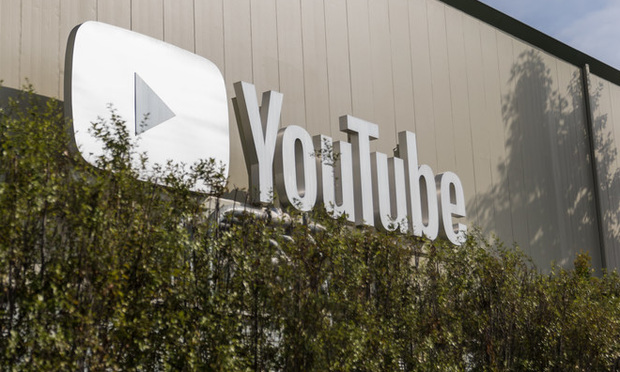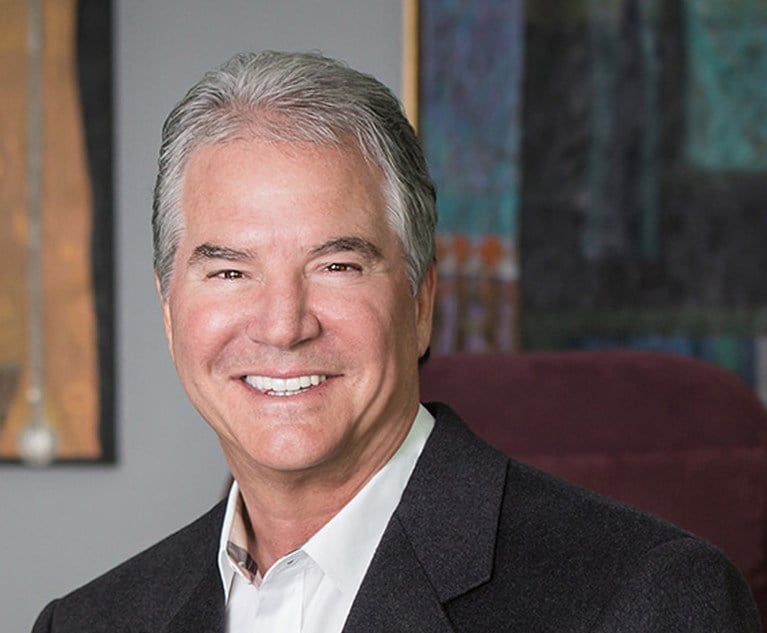Ninth Circuit: YouTube May Be Ubiquitous, but That Doesn't Mean It Violated PragerU's First Amendment Rights
"That YouTube is ubiquitous does not alter our public function analysis," wrote Judge M. Margaret McKeown in a decision upholding the dismissal of the conservative nonprofit educational and media organization's lawsuit against Google's YouTube.
February 26, 2020 at 12:34 PM
4 minute read
 (Photo: Jason Doiy/ALM)
(Photo: Jason Doiy/ALM)
Nonprofit educational and media organization Prager University has struck out in its bid to revive its First Amendment and false advertising lawsuit against Google's YouTube where the tech giant faced claims of bias against conservative content creators.
A three-judge panel of the U.S. Court of Appeals for the Ninth Circuit upheld a lower court ruling which found that YouTube was not a state actor subject to judicial scrutiny under the First Amendment.
"Despite YouTube's ubiquity and its role as a public facing platform, it remains a private forum, not a public forum subject to judicial scrutiny under the First Amendment," wrote Ninth Circuit Judge M. Margaret McKeown in an opinion joined by Judge Jay Bybee and U.S. District Judge Fernando J. Gaitan Jr. of the Western District of Missouri, sitting by designation.
The lawsuit filed in 2017 claimed that YouTube's decisions to tag certain PragerU videos as age-restricted violated the First Amendment, since the company was operating "a public forum for speech." But Wednesday's Ninth Circuit decision held that "to characterize YouTube as a public forum would be a paradigm shift."
"PragerU's claim that YouTube censored PragerU's speech faces a formidable threshold hurdle: YouTube is a private entity," McKeown wrote. "The Free Speech Clause of the First Amendment prohibits the government—not a private party—from abridging speech," she wrote. Wednesday's decision noted that the U.S. Supreme Court held just last year in Manhattan Cmty. Access Corp. v. Halleck that "merely hosting speech by others is not a traditional, exclusive public function and does not alone transform private entities into state actors subject to First Amendment constraints."
PragerU's suit also claimed that YouTube violated the Lanham Act by holding itself out as a forum for "freedom of expression" while making screening decisions based on criteria that weren't content-neutral. But the Ninth Circuit held that YouTube's statements about its content moderation practices did not constitute the sorts of commercial advertising and promotion subject to the federal false advertising law.
"Lofty but vague statements like 'everyone deserves to have a voice, and that the world is a better place when we listen, share and build community through our stories' or that YouTube believes that 'people should be able to speak freely, share opinions, foster open dialogue, and that creative freedom leads to new voices, formats and possibilities' are classic, non-actionable opinions or puffery," McKeown wrote.
Browne George Ross partner Peter Obstler, who represents PragerU, didn't immediately respond to a request for comment Wednesday morning. In a statement emailed Wednesday afternoon, Marissa Streit, CEO of PragerU, said the organization was considering its next steps in the federal case. "As we feared, the Ninth circuit got this one wrong, and the important issue of online censorship did not get a fair shake in court," she said. "Sadly, it appears as if even the Ninth Circuit is afraid of Goliath — Google. We're not done fighting for free speech and we will keep pushing forward."
Farshad Shadloo, a YouTube spokesperson, said Wednesday that Google's products are not politically biased and that the company goes to "extraordinary lengths" to build products and enforce policies in ways that are politically neutral. "Our platforms have always been about sharing information everywhere and giving many different people a voice, including PragerU, who has over 2 million subscribers on their YouTube channel," Shadloo said. "PragerU's allegations were meritless, both factually and legally, and the court's ruling vindicates important legal principles that allow us to provide different choices and settings to users," he said.
The company is represented in the case by counsel at Wilson Sonsini Goodrich & Rosati.
Wednesday's ruling upholds a 2018 decision from U.S. District Judge Lucy Koh of the Northern District of California.
Read more:
Judge Poised to Knock Out PragerU's State Law Claims Against YouTube
Appellate Panel Ponders How the First Amendment Applies to YouTube
This content has been archived. It is available through our partners, LexisNexis® and Bloomberg Law.
To view this content, please continue to their sites.
Not a Lexis Subscriber?
Subscribe Now
Not a Bloomberg Law Subscriber?
Subscribe Now
NOT FOR REPRINT
© 2025 ALM Global, LLC, All Rights Reserved. Request academic re-use from www.copyright.com. All other uses, submit a request to [email protected]. For more information visit Asset & Logo Licensing.
You Might Like
View All
Assessing the Second Trump Presidency’s Impact on College Sports


LSAT Administrator Sues to Block AI Tutor From Using ‘Famous, Distinctive’ Test Prep Materials
3 minute readLaw Firms Mentioned
Trending Stories
- 1Public Notices/Calendars
- 2Wednesday Newspaper
- 3Decision of the Day: Qui Tam Relators Do Not Plausibly Claim Firm Avoided Tax Obligations Through Visa Applications, Circuit Finds
- 4Judicial Ethics Opinion 24-116
- 5Big Law Firms Sheppard Mullin, Morgan Lewis and Baker Botts Add Partners in Houston
Who Got The Work
J. Brugh Lower of Gibbons has entered an appearance for industrial equipment supplier Devco Corporation in a pending trademark infringement lawsuit. The suit, accusing the defendant of selling knock-off Graco products, was filed Dec. 18 in New Jersey District Court by Rivkin Radler on behalf of Graco Inc. and Graco Minnesota. The case, assigned to U.S. District Judge Zahid N. Quraishi, is 3:24-cv-11294, Graco Inc. et al v. Devco Corporation.
Who Got The Work
Rebecca Maller-Stein and Kent A. Yalowitz of Arnold & Porter Kaye Scholer have entered their appearances for Hanaco Venture Capital and its executives, Lior Prosor and David Frankel, in a pending securities lawsuit. The action, filed on Dec. 24 in New York Southern District Court by Zell, Aron & Co. on behalf of Goldeneye Advisors, accuses the defendants of negligently and fraudulently managing the plaintiff's $1 million investment. The case, assigned to U.S. District Judge Vernon S. Broderick, is 1:24-cv-09918, Goldeneye Advisors, LLC v. Hanaco Venture Capital, Ltd. et al.
Who Got The Work
Attorneys from A&O Shearman has stepped in as defense counsel for Toronto-Dominion Bank and other defendants in a pending securities class action. The suit, filed Dec. 11 in New York Southern District Court by Bleichmar Fonti & Auld, accuses the defendants of concealing the bank's 'pervasive' deficiencies in regards to its compliance with the Bank Secrecy Act and the quality of its anti-money laundering controls. The case, assigned to U.S. District Judge Arun Subramanian, is 1:24-cv-09445, Gonzalez v. The Toronto-Dominion Bank et al.
Who Got The Work
Crown Castle International, a Pennsylvania company providing shared communications infrastructure, has turned to Luke D. Wolf of Gordon Rees Scully Mansukhani to fend off a pending breach-of-contract lawsuit. The court action, filed Nov. 25 in Michigan Eastern District Court by Hooper Hathaway PC on behalf of The Town Residences LLC, accuses Crown Castle of failing to transfer approximately $30,000 in utility payments from T-Mobile in breach of a roof-top lease and assignment agreement. The case, assigned to U.S. District Judge Susan K. Declercq, is 2:24-cv-13131, The Town Residences LLC v. T-Mobile US, Inc. et al.
Who Got The Work
Wilfred P. Coronato and Daniel M. Schwartz of McCarter & English have stepped in as defense counsel to Electrolux Home Products Inc. in a pending product liability lawsuit. The court action, filed Nov. 26 in New York Eastern District Court by Poulos Lopiccolo PC and Nagel Rice LLP on behalf of David Stern, alleges that the defendant's refrigerators’ drawers and shelving repeatedly break and fall apart within months after purchase. The case, assigned to U.S. District Judge Joan M. Azrack, is 2:24-cv-08204, Stern v. Electrolux Home Products, Inc.
Featured Firms
Law Offices of Gary Martin Hays & Associates, P.C.
(470) 294-1674
Law Offices of Mark E. Salomone
(857) 444-6468
Smith & Hassler
(713) 739-1250







